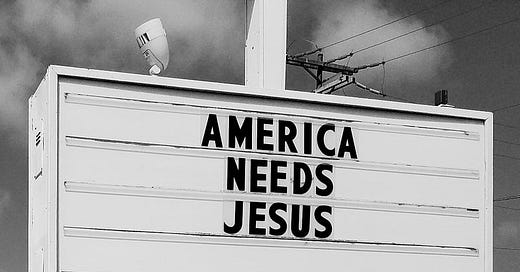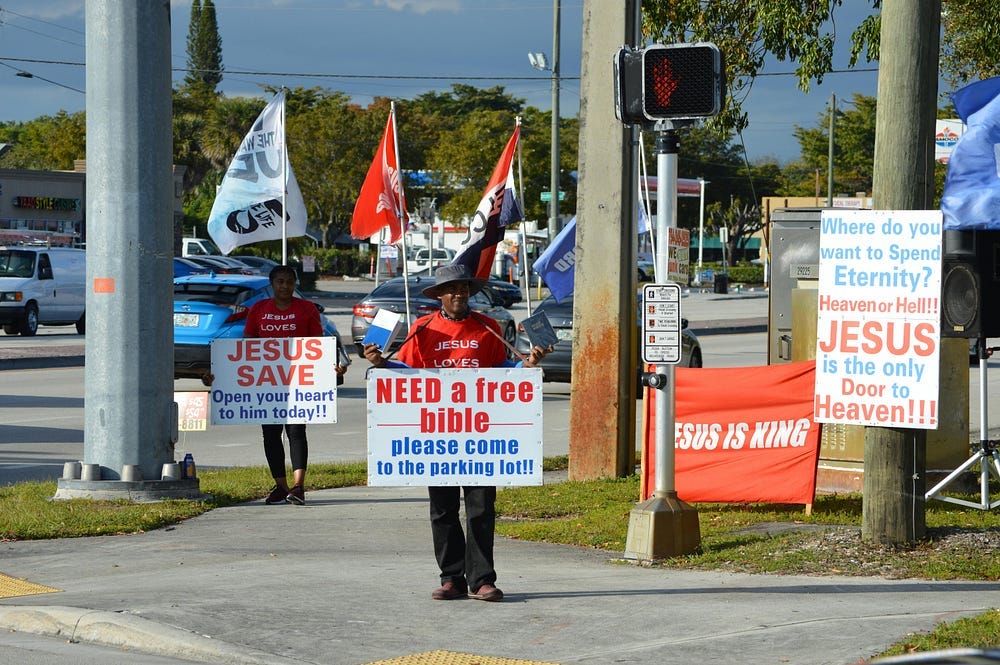Kingdom Come: How Christian Nationalism Seized American Politics
The roots of a desired faith-driven empire built on a vision of biblical rule
This won’t be a newsletter with links to other articles. I watched some American politics on the tellybox last night and, well…

The Christian right scares the bejaysus out of me.
I live on the Polish-Czech border, and my in-laws knew very well the horrors of WWII. My wife’s grandfather had been in seven different camps as the Germans tried to break his resolve. They didn’t.
A five-minute drive from my house there’s an old Nazi quarry where 1000s of Jewish, Polish, Czech, and Hungarian prisoners were forced into labor before they were hustled off to concentration camps as their bodies and spirits broke.
It’s filled in today, and people fish there; I hate it. The place gives me the heebie-jeebies, and looking at the state of things in America, I feel that history could, once again, repeat itself because we’re too foolish to learn.
In this article, I want to talk about:
The genesis of (American) Christian nationalism
Ronald Reagan anoints the beast
The rise of the ‘New Christian Right’
Seven Mountains and The New Apostolic Reformation
The battle at the Capitol
Toward a biblical governance
The genesis of (American) Christian nationalism
Take a moment there and imagine this: A silent swell rises on the horizon of 1970s America, powered not by the oceans or even the oceans of oil under the American soil, nor by the might of America’s industrial plants but by hearts bearing crosses, filled with voices raised in both hymn and battle cry.
This was the genesis of a crusade that has twisted power structures to the will of a few determined men and has been allowed to fester deep within American politics.
In a way, you could think of it as being less about a nation and more about a kingdom — a kingdom propped on ancient promises from ancient books and the ambitious unity of Christian nationalists making their move to grasp a power they feel has been given them by God.
1970s USA
The 1970s kept the ball of modulation rolling after a previous decade that saw tremendous change in American society. The world was changing fast, and for some, it was spinning toward Satanic-fuelled chaos and disorder.
The Supreme Court had cut prayer out of schools, torn away the Bible’s hold on public life, and made abortion legal. For some Americans, this smelled of a country adrift from its moral, God-given, moorings.
Enter the voices — men like Jerry Falwell, James Dobson, and Paul Weyrich — figures who brought not just fire and brimstone sermons but directives. They came with instructions and blueprints, a vision that drew from both their faith and their ambitions for power, founding groups like the Moral Majority and the Family Research Council (I will not link them, as I wouldn’t like your internet cookies to be infected by hate).
Falwell preached at his Moral Majority pulpit, calling his congregation to turn their worship into a war on the USA's modernity.
Dobson frothed at the mouth and wielded family values like a battleaxe. He railed against abortion, feminism, and what he termed the “erosion” of traditional families.
Not content with one flock, Weyrich aimed to unite Protestants and Catholics into a force as immovable as granite. United together, he believed, they would break the barrier between pew and ballot box, shaping politics to suit a Christian moral mandate.

Ronald Reagan anoints the beast
Onwards now to August 1980.
A sports arena in Dallas brims with over 15,000 evangelical faithful, all summoned for a gathering known as the National Affairs Briefing. In the crowd, whispers float about prophecy, judgment, and the threat of a thousand-day countdown before America loses her grip on freedom.
The speakers howled like watchmen at the gates, warning that divine justice was near. Action was quickly required, and it was to be glorious.
It’s here, amidst the roar of believers, that Ronald Reagan steps forward. “I endorse you,” he tells the crowd — a message that cemented evangelicals as a political bloc.
Lurking behind him is a lesser-known figure: Robert Billings, a campaign advisor and architect of the Moral Majority. And in Billings' shadow lingers another man—R.J. Rushdoony, a man whose brand of extreme Christian Reconstructionism created a vision that made the Old Testament into a constitution.
This theology seeped in quietly, was rarely named, yet slowly it took hold, like a parasite in the minds of those who had started to believe they weren’t just on Earth to live as Christians but to rule as such.
Rushdoony’s dream was absolute.
His “Institutes of Biblical Law” painted a society ruled with an iron fist, where justice came swiftly and was divinely delivered. His doctrines justified slavery, denied the Holocaust, and endorsed punishment for what he deemed biblical crimes.
His ideas fed into an emerging ethos. He believed, and others were coming to believe, that true redemption meant casting one’s faith into the fire of American politics.
Here’s a video of the event. It’s all rather chilling. Reagan begins his waffling around the 12-minute mark:
The rise of the ‘New Christian Right’
By 1986, something more formal was beginning to take shape.
On American Independence Day on the Lincoln Memorial steps, representatives from different denominations and persuasions stood to sign the “Manifesto of the Christian Church.”
Jay Grimstead of the Coalition on Revival guided this group, believing that uniting the Christian faiths would lead to true change. They spoke out against abortion and evolution, gave their version of the rights of parents, and the idea that God's law was not just fit for Sunday mornings but every day of the week.
With the unity Grimstead imagined, something else was born — a notion that to step back was to concede defeat, that to rule was their right.
They saw Reconstructionism as not just a possibility but as something necessary because it was a way of rooting Christianity into the soil of American institutions so deeply that it would be impossible to weed out.
This fundamentalist drive to take a stranglehold of America’s moral compass wasn’t just an abstract mission anymore; it had turned into a strategic plan that was working for those behind it.

Seven Mountains and The New Apostolic Reformation
Out of the movement came another twist.
The New Apostolic Reformation (NAR) sprung up as the ’80s ended, carrying with it the charismatic fervor of faith healers and self-proclaimed prophets.
One of its intellectual fathers, C. Peter Wagner, helped organize this fervor, working alongside Cindy Jacobs to spread dominionism and "spiritual warfare."
These battles weren’t just metaphorical and spiritual for them; they were grounded in prayer. They would not only challenge the demons their followers faced living in a sinful America, but they would also claim land and political influence.
This belief grew into what became known as the “Seven Mountain Mandate.”
The seven spheres of society—family, government, religion, education, business, media, and the arts—each became targets for reclaiming and reshaping.
Lance Wallnau, a self-proclaimed prophet, ran with this mandate, urging Christians to infiltrate and reshape America from the ground up. Like their invading settler ancestors laying claim on uninhabited land, they’d take control by “penetrating” systems, embedding biblical governance in every American institution.
Look at the mess surrounding school councils in America and the banning of books. These are no accidents; they were designed to occur.

The battle at the Capitol
With Donald Trump’s unfortunate, for the rest of the world, rise, figures like Wallnau saw the fulfillment of a prophecy.
In Trump, they found their King Cyrus, their imperfect champion, destined to restore their place of authority.
During the Capitol insurrection, the NAR's influence unfurled across the grounds. Men and women blew shofars and chanted in tongues, invoking spirits as the threat of violence filled the air.
In the shadow of a gallows and the Confederate flag, they prayed fervently, calling on God to bring order to what they saw as a divine uprising.
Dutch Sheets, a pastor who popularized the NAR’s flag and not a brand of bed sheet from the Netherlands, went live in a prayer call, claiming divine authority over the scene. His voice echoed over loudspeakers through the crowd as rioters attempted to breach America’s legislative heart.
In that riot, the physical and the spiritual aim of the American Christian right collapsed into one, their vision for Christian rule as tangible as the walls they battered against.
To Sheets and his followers, this wasn’t an assault on a government building. This was an act of divine reclamation.

Toward a biblical governance
Today, the shadow of Christian nationalism stretches long and has deep pockets.
Through the Seven Mountain Mandate, Wallnau and his allies have continued to mobilize. They preach in swing states, aiming to turn polling booths into prayer chambers.
The Ziklag Group, a charity Wallnau advises, pushes for control in education, seeking to “take down” the secular public school system. In their eyes, even textbooks and lesson plans should ring loudly and proudly with Scripture, as America’s young minds need to know that the Bible is their moral compass. No to evolution, no to birth control, no to women’s rights, gay right, a giant yes to the End of Days prophecy, along with Zionism, which is a large part of the prophecy.
But their ambition doesn’t stop at education. They aim to infiltrate politics, local and national, impregnating institutions with their biblical worldview.
Through pro-Trump rallies and prophecies linking the fate of a nation to a chosen leader, they beckon America toward a vision where faith is governance, where moral law is drawn from the Books of Leviticus, Exodus, Revelation, and more, as much as the constitution they claim to hold so dear.
Good luck in the election folks, most of us on this side of the pond are hoping that orange clown and his couch-humping sidekick gets their a$$es kicked.
Here’s a recent PBS video about the American Christian Nationalism.
Online counseling sessions are available here.
Thanks for reading my article.
You can donate here, via Paypal, or via Bitcoin, or you can buy me a book here.
My different social media channels are here.




